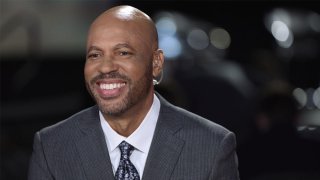
- Programming note: Watch Monte Poole's interview with Jim Trotter on "Race in America: A Candid Conversation" on Friday night at approximately 3:30 p.m. PT on NBC Sports Bay Area before "Warriors Pregame Live."
The NFL, the most popular sport in America, operates like a 300-ton tank impervious to all that is not related to revenue. Its pursuit of money leaves brains scrambled, humanity scorched and principles bending to the whims of profit as it sells hypocrisy to an adoring public.
And woe to those, like veteran sports journalist Jim Trotter, with the temerity to question the league’s commitment to its stated societal vows.
Stay in the game with the latest updates on your beloved Bay Area and California sports teams! Sign up here for our All Access Daily newsletter.
Noting the racial and social inequalities in the workplace during his five years as an employee at NFL Media, Trotter was unceremoniously buried by the tank.
Trotter’s contract was not renewed last March – four months after he allegedly was told to expect an extension. The timing of his dismissal was curious enough to compel him to file a lawsuit in U.S. District Court in New York alleging racial discrimination. The NFL, NFL Enterprises and NFL Network Services are named as defendants.
“I'm looking at our newsroom and we are covering a player population that is 60 to 70 percent Black,” Trotter says as a panelist on “Race in America: A Candid Conversation,” on NBC Sports Bay Area. “And yet in our newsroom, we don't have one black manager. We don't have one Black copy editor. We don't have one full-time Black news assistant.”
Trotter says he broached the subject several times with NFL Media management, but no one was willing to address it. So, he went public. He took the issue to NFL commissioner Roger Goodell during Super Bowl news conferences in 2022 and again in 2023.
NFL
“And, obviously, it ruffled some feathers,” Trotter says. “Because in November of 2022, I was told that they couldn't see any reason why my contract would not be renewed. And then, three weeks after I asked Roger Goodell that question for the second time, I was told they weren't so sure that it would be renewed. And three weeks later, I was told it's not going to be renewed.
“So draw your own conclusions from that. I drew mine and that's why we filed a retaliation suit against the NFL.”
The NFL, which contends Trotter’s employment termination was a “routine and sound business decision” reduction, responded to the lawsuit filed last September was a written statement:
“We share Jim Trotter’s passion for quality journalism created in and supported by a diverse and inclusive environment. We take his concerns seriously but strongly dispute his specific allegations, particularly those made against his dedicated colleagues at NFL Media. Mr. Trotter’s departure from NFL Media was one of many difficult decisions — similar to decisions recently made by many other media organizations — to address a challenging economy and a changing media environment. Jim was one of many employees who were unfortunately affected by these business decisions.
“We appreciate Jim’s five years of service at NFL Media and wish him much success in his new role. The NFL has made significant strides in improving diversity and inclusion and, while we acknowledge there is always more work to be done, we are committed to continuing that progress.”
The league says it is doing its part to promote a level of diversity and inclusion that benefits all. You might have seen, for example, the “End Racism” painted onto the grass end zones. Or, maybe, the “Inspire Change” decals on the helmets of the players.
But there remains a divide between what is said and what is done. That’s what frustrated Trotter, who laid out a pattern of bigoted behavior that the NFL tolerates because, well, there is money to be made.
Trotter’s 53-page lawsuit alleges that racism and discrimination are indeed rampant in the NFL, with some of the examples already in the public space, including racist comments allegedly made by Dallas Cowboys owner Jerry Jones and Buffalo Bills owner Terry Pegula.
Though both Jones and Pegula still hold their positions, Daniel Snyder was nudged out by the league not because the Washington football team was known to have a toxic, misogynist workplace but because sponsors began grumbling about it.
With the organization facing a series of unsavory allegations and lawsuits, Snyder was erased because he became a threat, a weak link in the tank’s chain. He’s now a former owner, still a billionaire but a social pariah.
Shaun Fletcher, professor of Public Relations and Sports Communication at San Jose State University, spent two years, from 2007 through 2009, as a college scouting assistant for the Commanders (then known as the “Redskins”). He was an eyewitness to much of the misconduct within the franchise and discussed it on the panel with Trotter.
“During that time, it was apparent to me just how strong the power structure was and just how important representation is,” Fletcher says. “And not simply at my level. (Also) within the operation side of things, even up to the general manager level and the ownership level. Because the operation took on the face of its leader, Daniel Snyder.
“The entire organization looked and operated and functioned just how Daniel Snyder operated and functioned himself as a leader of it. And we see that reverberating across the other 31 franchises within the National Football League. I saw a tremendous amount of dysfunction.”
The rest of the league, based on Fletcher’s experience at league functions was no different. Team executives took on characteristics of the primary owners, none of whom was then, or is now, Black.
Fletcher has moved on from the NFL, but Trotter, now a columnist with The Athletic, remains in the business but much less affiliated with the league he spent 30 years covering.
“People think I have animosity toward the NFL,” Trotter says. “I do not. I don't at all. All I'm asking the NFL to do is to be what it says it is. And, as journalists, isn't that our job? To hold the people in power accountable. To make sure that their actions reflect their words.
“So, for me, as I've said to Roger Goodell and others, diversity is good business, particularly in a league where your player population is 60 to 70 percent Black. It is also good business to have people who have shared these players as cultural backgrounds, their life experiences and whatnot at the table to help formulate a plan for how they are covered.”
The NFL last week filed a motion to dismiss Trotter’s lawsuit. The league’s 26-page legal brief argues that the suit has no merit not because the plaintiff is wrong but because the NFL broke no laws.
Trotter has no plans to pursue a financial settlement and walk away content with full pockets. He is, by all accounts, in this as a matter of principle.
He also knows the NFL stops for no man. Too big, too powerful. It expects to win every battle because it has allies in high places and a gargantuan tank powered by billions in reserves.


